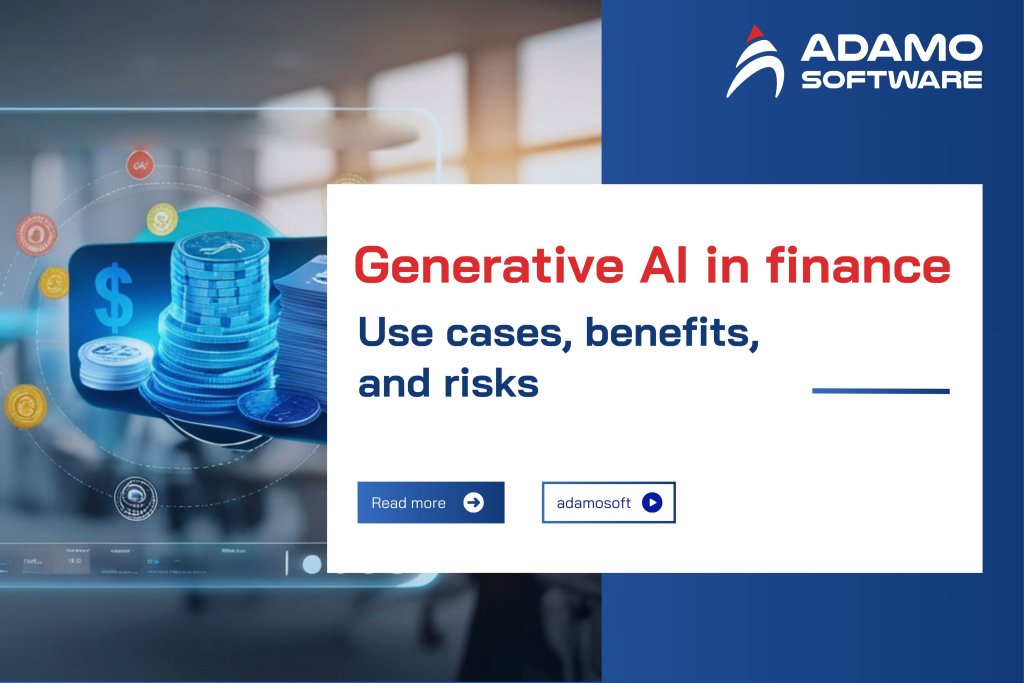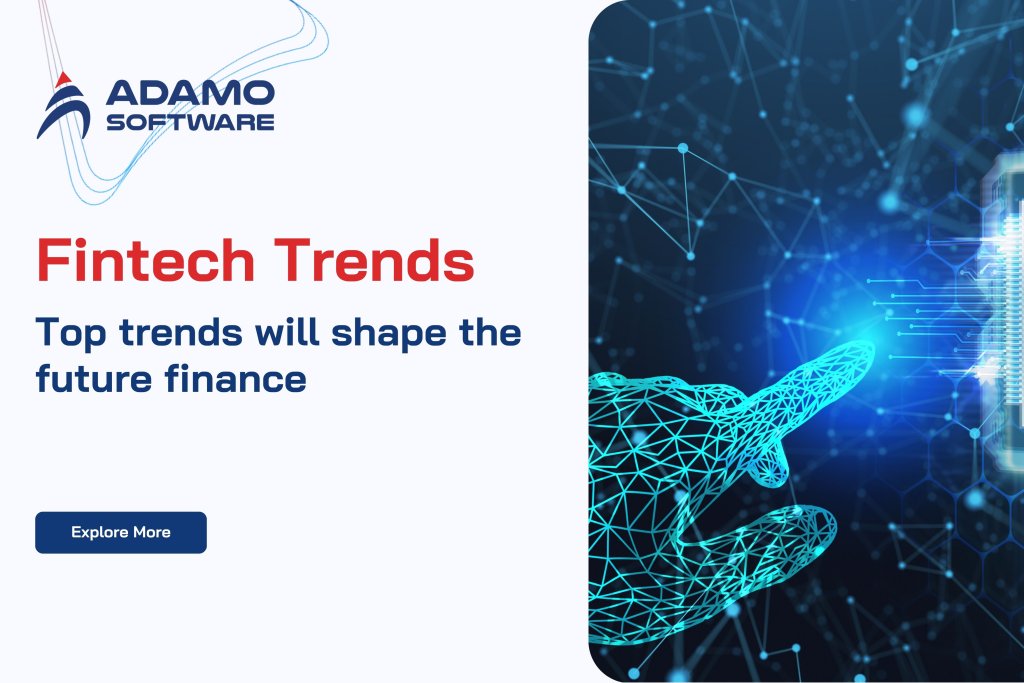Enterprise blockchain development: Features and real-world applications

Blockchain technology revolutionizes industries by delivering enhanced transparency, robust security, and operational efficiency. In the enterprise services sector, blockchain development holds great promise. It can revolutionize traditional business processes and pave the way for innovative solutions.
Whether you are already well-versed in technology or just starting to explore the potential of blockchain, our in-depth guide will help you better understand enterprise blockchain development services. Are you ready to uncover the mystery of the blockchain ecosystem in the enterprise sector? Keep reading this blog!
I. Understanding enterprise blockchain development: What is it?
Enterprise blockchain development involves creating and implementing solutions for large-scale organizations’ specific needs and challenges. However, unlike public blockchains, which are decentralized and open to anyone, enterprise blockchains are typically permissioned networks, with access restricted to authorized participants. These private permissioned networks allow businesses to collaborate, exchange data, and make transactions securely and efficiently while controlling sensitive information.
II. What are the differences between public and enterprise blockchains?
With features like decentralization, transparency, and top-notch security, enterprise blockchain development has made its mark in many fields. While the basic ideas remain the same, how they are implemented can vary depending on who uses them and why. To truly grasp the key differences between public and enterprise blockchains, we must break them down individually.
In this section, let’s dive deeper and explore each aspect and how it affects the type of blockchain we are looking at:
| Aspect | Public Blockchains
|
Enterprise Blockchains
|
| Accessibility
|
|
|
| Decentralization
|
|
|
| Transparency
|
|
|
| Consensus Mechanisms |
|
|
| Speed and Scalability
|
|
|
| Use Cases
|
|
|
| Security
|
|
|
| Development and Governance
|
|
|
III. Pros and cons of enterprise blockchain development
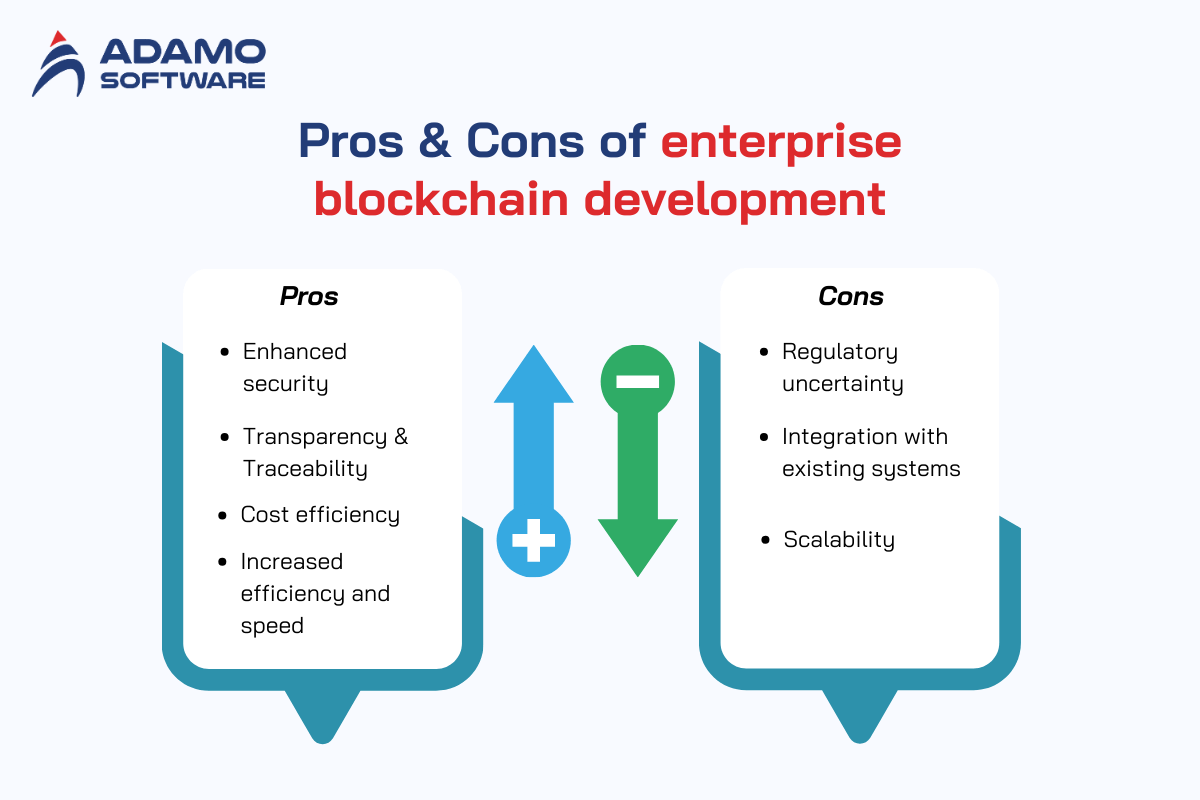
1. The pros of Enterprise Blockchain Development
Enterprise blockchain development services have many benefits that businesses can take advantage of, such as:
Enhanced Security
The decentralized structure of enterprise blockchain development ensures high resistance against fraud and tampering. Cryptographic hash functions securely link each block to its predecessor, establishing a reliable and unchangeable transaction chain.
Transparency and Traceability
Enterprise blockchains offer comprehensive transparency and detailed traceability of transaction data. This feature is precious in supply chain management, as it empowers stakeholders to monitor a product’s entire journey from the point of manufacture to its destination.
Cost Efficiency
By removing the need for intermediaries and leveraging smart contracts, enterprise blockchain development enables businesses to streamline processes, significantly reducing transaction handling, auditing, and compliance expenses.
Increased Efficiency and Speed
The adoption of enterprise blockchains facilitates faster transaction processing compared to traditional systems. This acceleration minimizes the time required for various business operations, enhancing efficiency and boosting overall productivity.
2. The cons of Enterprise Blockchain Development
Along with the benefits, Enterprise Blockchain development certainly has some disadvantages and challenges.
Regulatory Uncertainty
Currently, many blockchain and cryptocurrency regulations are still being developed. As a result, businesses face the challenge of navigating and complying with different rules in different jurisdictions.
Integration with Existing Systems
Integrating blockchain technology with enterprise systems can be complex and requires careful planning. Additionally, compatibility and interoperability issues can arise unexpectedly during integration.
Scalability
Scalability is a crucial concern as enterprise blockchain networks grow. Ensuring your network can handle more transactions without compromising performance is a constant challenge.
IV. Essential features in enterprise blockchain development
Many use cases of enterprise blockchain development in the enterprise ecosystem are drawn to its various features that help fill security gaps and loopholes. Here are some of the top features of enterprise blockchain development.
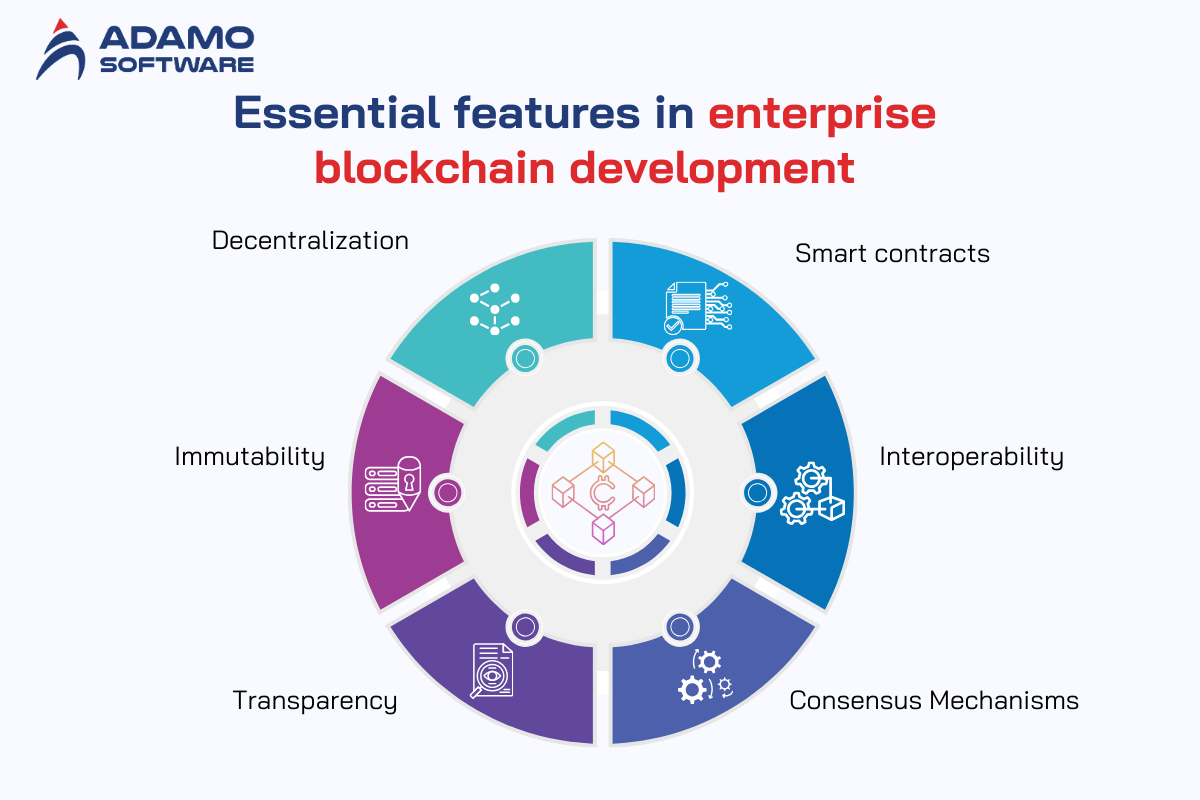
1. Decentralization
In an enterprise setting, it is commonly believed that everything from compliance to communication must be done through a centralized route. Your business can create a temper-proof system by incorporating a decentralized mechanism called Blockchain of Things into its business communication networks. This approach allows businesses to operate in a system that cannot be hacked.
2. Immutability
The fact that blockchain operates on an immutable mechanism, making it impossible to change what has been included in the blocks, makes quality and accuracy extremely important. In a traditional system, quality becomes one of the significant issues, leading to delays in delivery times and results in the result not being of quality or even not matching the original requirements.
However, when a business operates under the pressure of its data being locked in the system, it automatically increases its ability to complete information and maintain quality.
3. Transparency
The fact that enterprise blockchain development brings everything out into the open is blowing a whole new wave into how employees and stakeholders act responsibly in the business. The transparency features that blockchain offers are transforming the future of transactions.
The inherent transparency of blockchain transforms the traditional business landscape by making every transaction immutable and traceable. This visibility promotes accountability among employees and stakeholders. Knowing that their actions are permanently recorded fosters a greater sense of responsibility, thus reducing the risk of fraudulent activities and unethical behavior.
Furthermore, the transparent nature of blockchain builds trust among stakeholders, as they can verify the authenticity of each transaction in real time. The distributed and decentralized ledger system ensures that no single entity can manipulate or alter records, reinforcing the idea of shared responsibility.
4. Smart Contracts
Self-executing contracts with pre-determined terms and conditions are called smart contracts. These blockchain-based automated contracts have several notable benefits: they promote efficiency and reduce operating costs by streamlining procedures and eliminating the need for intermediaries.
By automating processes, smart contracts reduce the possibility of errors and disputes while increasing the speed and accuracy of transactions. Their implementation promotes a smooth, open contract environment by accelerating the entire contract lifecycle. Smart contracts are a breakthrough in contract management, providing a decentralized, secure and efficient way to negotiate online agreements.
5. Interoperability
Interoperability in blockchain refers to the ability of a system to interact with other blockchain networks and systems seamlessly. This feature enables collaboration, information exchange, and efficient communication between systems and organizations. Interoperability allows blockchain networks and systems to operate as a single unit, improving data exchange and resource efficiency. It plays a crucial role in breaking down silos, allowing for a more collaborative and connected digital ecosystem.
With interoperability, organizations can leverage the strengths of multiple platforms, ensuring a more streamlined approach to data sharing and communication across the digital landscape. Ultimately, this integration promotes a more scalable, efficient, and collaborative environment within the broader framework of blockchain applications.
6. Consensus Mechanisms
Blockchain consensus mechanisms are protocols that allow nodes in the network to decide whether a transaction is valid. These systems are essential to protecting the integrity of the blockchain because they ensure that each member has a consistent and trustworthy record of all transactions.
Blockchain networks create a transparent and secure environment by preventing fraud through consensus building, such as double spending. Consensus mechanism techniques are advantageous because they can establish an everyday reality among nodes, improving the distributed ledger’s reliability and immutability. Various consensus algorithms, including Proof of Work (PoW) and Proof of Stake (PoS), provide distinct methods for achieving consensus and meeting various blockchain networks’ unique requirements and goals. On that note, we will look at the requirements for a well-planned enterprise blockchain system.
Also read: Blockchain application development: Tech stacks and DApp integration methods
V. Top 9 real-world applications of enterprise blockchain development
Here are 9 real-world applications of enterprise blockchain development that businesses can leverage:
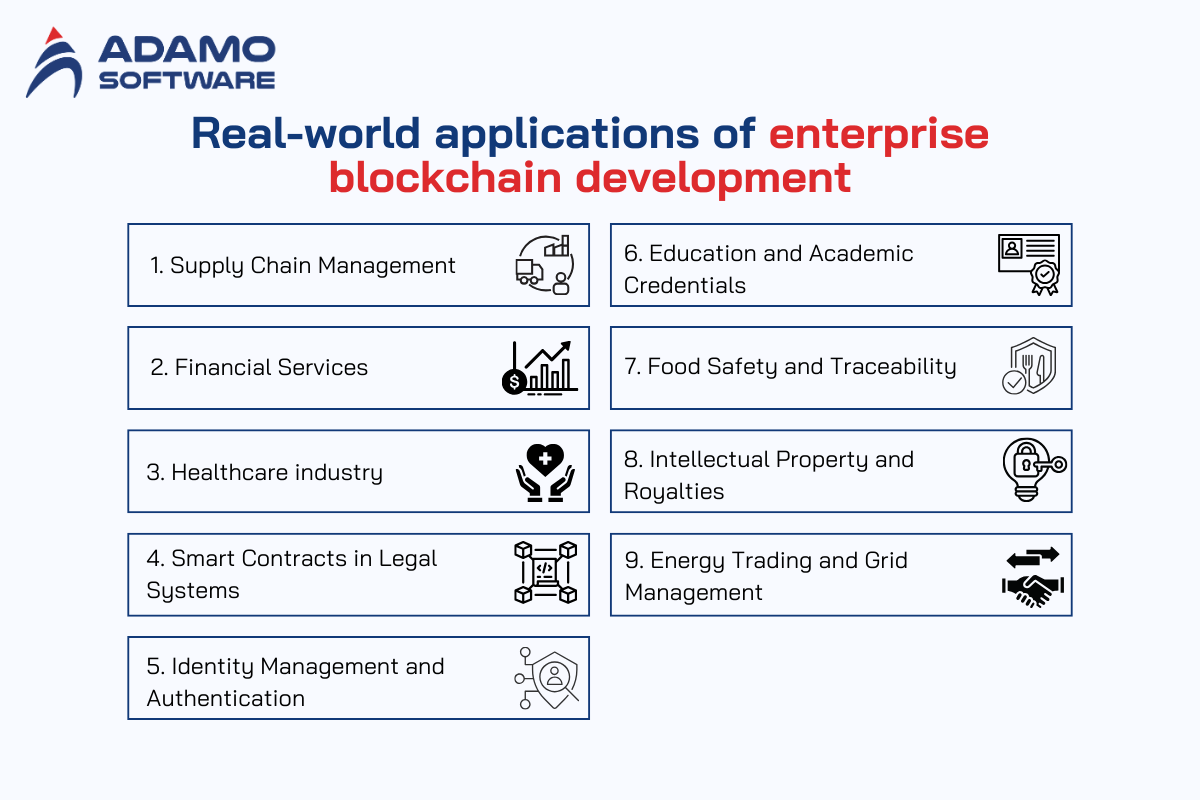
1. Supply Chain Management
By providing visibility, traceability, and accountability, Enterprise Blockchain can revolutionize supply chain processes. These features help reduce fraud, ensure product authenticity, and streamline logistics.
2. Financial Services
Enterprise blockchain development services are transforming the financial industry by providing faster and more secure cross-border payments, reducing fraud through transparent transactions and enabling the issuance of digital assets.
3. Healthcare industry
In the healthcare industry, enterprise blockchain can enhance data security and streamline patient record management. It helps facilitate interoperability between different healthcare providers.
4. Smart Contracts in Legal Systems
The smart contract functionality of enterprise blockchains can revolutionize legal processes. Smart contracts are automated agreements that self-execute based on predefined terms embedded directly within the code. They can automate and enforce legal contracts, reducing the need for intermediaries and minimizing the risk of disputes.
For example, in real estate transactions, smart contracts can automatically transfer ownership of the property after meeting pre-defined conditions.
5. Identity Management and Authentication
Businesses can have more control over their data and grant access only to the parties they need. This can increase privacy and significantly reduce identity theft. Governments and businesses can also use enterprise blockchain to securely and efficiently verify identities. For example, they are issuing and authenticating passports, licenses, and credentials.
6. Education and Academic Credentials
Educational and academic certificates can be verified and stored securely thanks to the development of enterprise blockchain. This eliminates the problems associated with degree and certificate fraud. It makes the verification process more efficient for employers and educational institutions. Additionally, employers can easily authenticate the qualifications of potential candidates.
7. Food Safety and Traceability
In the food industry, enterprise blockchain development can be used to increase the transparency and traceability of food. It can record every step of the supply chain process on the blockchain, from farm to fork. As a result, consumers can access real-time information about the origin, processing, and distribution of food products. This can help identify and eliminate sources of contamination in the event of food poisoning, ensuring food safety.
8. Intellectual Property and Royalties
Enterprise blockchain development can solve the problems related to copyright and intellectual property management. This allows artists, musicians, writers, and other content creators to use enterprise blockchain to timestamp their work. It also provides an immutable record of the creative process. Additionally, smart contracts can automate the payment of royalties. This ensures that creators receive their fair share of the income without the need for intermediaries.
9. Energy Trading and Grid Management
Peer-to-peer energy trading in decentralized grids can be facilitated. It allows businesses and individuals with renewable energy sources to sell surplus energy directly to consumers. Smart contracts on the blockchain can automate transactions and ensure a transparent and secure energy trading process. You are contributing to the efficiency and sustainability of the energy sector.
VI. Why hire our dedicated development team for your enterprise blockchain development
Developing and implementing an enterprise blockchain solution is a complex task that requires expert help. At Adamo, we have extensive experience in blockchain software and application development. Our technological expertise allows us to establish a blockchain enterprise ecosystem that decentralizes core business processes, contributing to the growth and innovation of your business.

Whether you are a startup or a small and medium-sized enterprise, we can help you scale your business. If you want to leverage the transformational power of blockchain for your business. Contact us today for free to develop enterprise blockchain solutions that will take your business to the next level.



